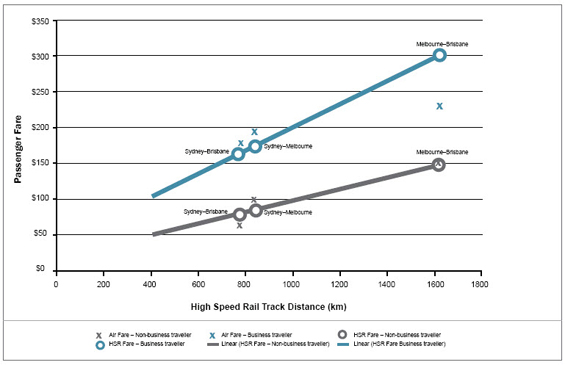Will the price of jet fuel go stratospheric?
Posted: August 9, 2011 Filed under: HSR High Speed Rail | Tags: Aviation Green Paper, Ben Sandilands, Decentralisation, High Speed Rail, HSR, John Quggin, Robert Merkel 5 Comments
Comparison of air fares and HSR fares used in the patronage demand forecasting modelling (one-way). NOTE: The clue to understanding this graph is the blue curve is business fares and the grey one is non-business fares
Ultimately, the bottom line in discussions about the warrant for High Speed Rail (HSR) always seems to come down to proponents’ certainty that the price of jet fuel will go stratospheric.
HSR won’t save time, won’t reduce fares, won’t increase economic activity, won’t promote decentralisation and is an extraordinarily expensive way to reduce carbon emissions – but if at the end of the day the cost of jet fuel means flying becomes ridiculously expensive, then, the argument goes, HSR is the only way of filling the breach.
There are a number of points to consider about this sort of scenario.
One is that while fuel is a significant part of the cost of flying, it’s not the whole story. At present, fuel comprises around a third of airline operating expenses, up from about 15% ten years ago. So a doubling in fuel costs will have a big impact, but it isn’t going to double fares – that would require fuel to quadruple in price (and other costs to remain constant).
Airlines could respond to higher fuel prices by finding ways to reduce their consumption of jet fuel. Aviation expert Ben Sandilands reckons “by 2036….jet fuel is realistically predicted to be at least 50% derived from algal or biological fuel substitutes….”. Others like Robert Merkel are not as convinced of the prospects for biofuels on the scale required. There’re plenty of “out there” proposals for alternative fuels and technologies (e.g. here and here) but they all look pretty speculative.
I don’t think alternative fuels have much potential at this stage but there’re better prospects in using jet fuel more efficiently. Although commercial jet aircraft speeds haven’t increased a lot over the last 40 years, the Aviation Green Paper says modern aircraft are 70% more fuel-efficient than they were in the late 1960s.
The current average fuel consumption of the world’s jet aircraft fleet is around 5 litres per 100 Revenue Passenger Kilometres (RPK), but this will improve as larger, more modern aircraft come into service. For example, a fully laden A380 consumes 3 litres per RPK and the new Boeing Dreamliner is claimed to be even better. Of course this is a mature technology so it’s unlikely historical efficiency gains can be carried forward at the same rate.
However not all experts expect fuel prices to go sky high. The Federal Government’s new High Speed Rail Study – Phase One report assumes both air and HSR fares will reduce by three per cent in real terms by 2015 and remain constant thereafter. Road vehicle operating costs on the other hand are assumed to increase in real terms by eight per cent to 2036 and by a further four per cent to 2056. None of this suggests the apocalypse is nigh.
There’s very little in the report elaborating on these assumptions but it’s as well to remember that the peak oil hypothesis does not mean an immediate end to oil production. Rather, as John Quiggin says, it means a gradual decline over 100 years or more (international oil production has been stable for the last seven years). Read the rest of this entry »